Real time human contact keeps radio relevant in a social media connected world. The biggest potential for radio isn’t music, but personality & talk, says talkSPORT PD Moz Dee.
“Yes, I am wearing a suit.” The program director of the UK’s sports talk station is one of nextrad.io‘s rare ‘jacketed & tied’ speakers, but it fits him – as we don’t hear commercial radio PDs talk about “quality and credibility” every day. High standards seem to pay off: over 3 million people tune into the once struggling station. What’s the big secret?
Talk radio shock jocks
When Emmis Communications launched Talk Radio UK in 1995 on the former medium wave frequency of BBC Radio 1, Moz Dee was hired as a presenter. He remembers that “the Americans came into town with huge loads of cash and put millions of quid on the table just for the license, before even putting on the light bowl. They said: we’re gonna bring shock jocks to the UK (imitates American accent). And guess what? It was sh*t; really, really bad! Because it was contrived; it didn’t have any confidence in itself.”
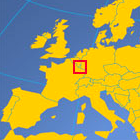 Emmis exits, Luxemburg enters
Emmis exits, Luxemburg enters
When the station was sold to Luxemburg’s CLT-UFA, it became in fact a commercial version of the BBC. “This didn’t work either, because, guess what? The BBC is really good at being the BBC…”, Moz Dee credits his ex-employer. Still, he recalls that “it did give some advertisers a bit more confidence and the audience slowly began to build.” Getting the World Cup 1998 broadcast rights was the start of covering sports – and a million pound turnover a month.
From KMK to UTV
Again, the station was sold (again, not for the last time). Dee apparently did not agree with all ideas of the new owner, former Sun-editor Kelvin MacKenzie, and left to the BBC for seven years. Turning the station’s format into sports talk was “a stroke of genius”, but still resulted in “a very confused brand”. One of the reasons: there were too many different shows. In the end, MacKenzie was “forced to sell” his radio assets (bundled in The Wireless Group). Since then, UTV Media owns talkSPORT.
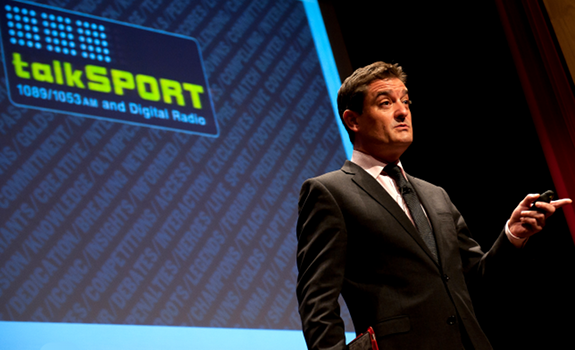
talkSPORT PD Moz Dee: “Once you break past the 3 million barrier, you become a must-have” (photo: Dan Smyth)
talkSPORT reaches 3m milestone
Moz Dee speaks of “a magic number” in commercial radio terms. “Once you break past the 3 million barrier, you become a must-have. People have to listen to you and buy from you.” The programmer claims that 56% of talkSPORT’s audience is part of ABC1 (highest social grades). He wants to grow further by keeping the station sound consistent, and investing in talent and in sports rights for the Rugby World Cup, Premier League, EURO 2012 and Olympics. “I think we’re in a very good place to build our audience and brand.”
 Always think of reasons
Always think of reasons
Moz Dee thinks that the main question for everything we do in radio should be: why? “As a producer when you preparing that item, as a DJ when you present that link, as an interviewer when you’re asking that question – think about why are you doing it. If the answer is ‘you don’t know’, then you probably shouldn’t be doing it. Lots of radio suffers from this lack of clarity.” talkSPORT wants to build “a proposition that is very confident in itself; it knows what it is.”
Don’t make phone(y) radio
Moz Dee thinks that listener interaction over the phone is overrated. Programmers and producers are often considered to be successful when the telephone lines are red hot, but “it takes a certain individual to pick up the phone and ring a radio station. Why would we produce programming purely for the minority that wants to react to a phone-in? Shouldn’t we produce radio that people want to listen to? I think that in commercial radio, for a long time we didn’t believe we could do that; that it was the domain of the BBC.”
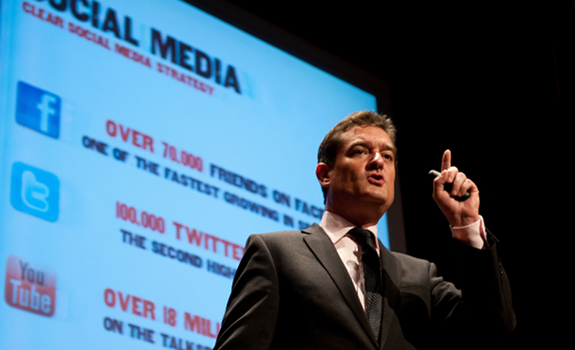
Moz Dee: “Real time human contact through radio is becoming increasingly important” (photo: Dan Smyth)
Quality and credibility prevail
“It’s about focus on quality and credibility”, Moz Dee says. “That means: not saying things that are just purely stupid, in an attempt to gain some kind of reaction from listeners by making them ring so we can create cheap content.” He rather speaks of breaking stories, doing stories differently, creating sound, engaging music, and great talent. “If you put those things together, along with a very clear focus on what your brand is about and what it should be achieving, then you begin to have traction with the audience.”
Radio fulfills human needs
The program director of talkSPORT is “hugely passionate” about what happens in radio, which he sees as “the most exciting and dynamic area to be in today” considering all digital developments. “In a world where social networking is a huge element of people’s lives, real time human contact through radio is becoming increasingly important.” Why radio isn’t dead yet? “It’s cool to listen and know that somebody’s alive at the same time you are.”
Radio personalities: listener companions
He thinks that speech is the best form of engaging listeners offering companionship. “The way we consume music has changed beyond all recognition. The success of the most popular music stations is based on talk. “If you tune into Chris Evans’ breakfast show, are you waiting for his next track? Or to be entertained by a fantastic speech broadcaster? These types of people are driving listeners. Whatever genre of radio you’re in, talent is absolutely key. People who know what they’re talking about and have the ability to converse with an audience. The growth area for radio is speech.”
talkSPORT radio success factors
Moz Dee sees 3 main reasons for the success of UK’s only commercial Talk station:
- a very pure defined look at what they’re doing as a brand
- a clear notion of who their radio audience is
- building their station’s credibility
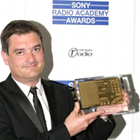 About
About
Moz Dee is program director of talkSPORT, the UK’s only national speech radio ‘for men who love to talk sport’. It broadcasts on AM and DAB. RAJAR currently reports over 3 million listeners for the UTV Media owned station. At the Sony Radio Academy Awards, Moz Dee became Station Programmer of the Year 2011 and talkSPORT won two more awards (including Station of the Year). Before, he has been managing editor of BBC Radio 5 live.


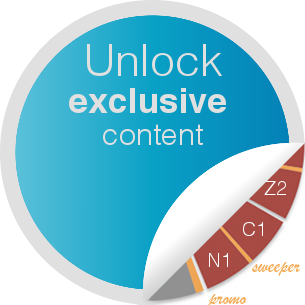


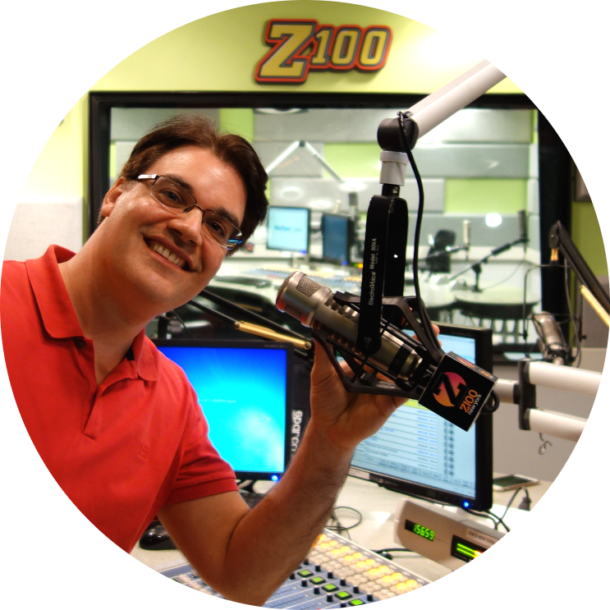
Add Your Comment